16. Snowden (2016)
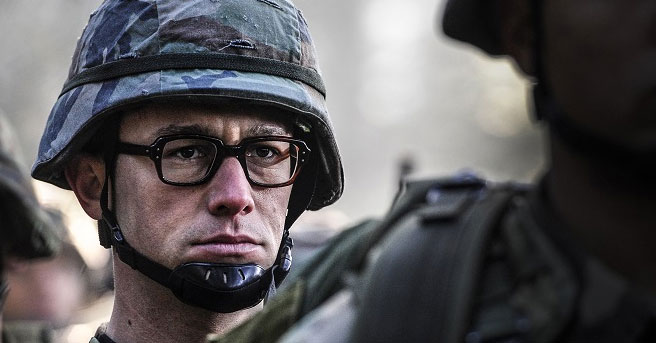
When it was announced that Stone was going to make a biopic about famous exiled whistleblower Edward Snowden, we all knew which side he would be on. It’s either Snowden or the American intelligence agency – the choice was clear. The question was, seeing as we are dealing with later-Stone, is it going to be as thrilling as his earlier historical fictions? The answer: not really.
The biggest problem of “Snowden” is the writing of its central character. Joseph Gordon-Levitt does an incredible job, but his performance is wasted on a script that refuses to make him a real character instead of a preachy talking point by Stone. According to this film, he’s an uncompromising boy scout and a super-human autodidact (even though Snowden himself never portrayed himself that way).
Snowden is so noble in this film that it becomes laughable. Even Snowden himself refused to rate this film, only to state that film manages to accurately portray the issues; well, his actual words were: ”It’s as a close as you can get in a film.” The final saccharine monologue at the end is simply embarrassing.
The film does have a good cast – with the exception of the most recent obnoxious example of nepotism Scott Eastwood – but that’s a given in a Stone film. But there’s an air of pointlessness surrounding the film. We all know the story and if you want to delve into the issue, you are better off watching “Citizenfour” since it’s much more accurate. The issues surrounding this subject are complex and Snowden’s story deserves to be told, but watching this film, it’s obvious that Stone was the wrong man for the job.
15. Alexander (2004)
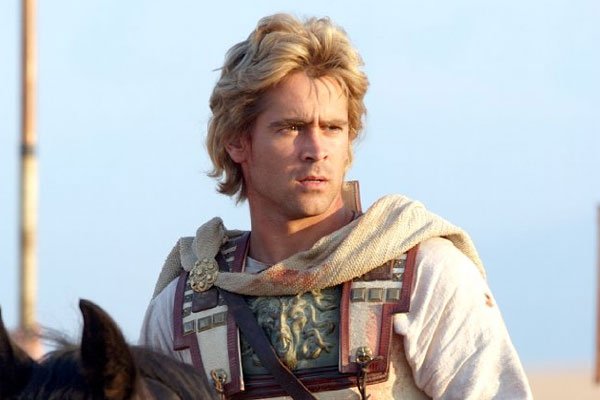
Stone’s big-budget take on one of the most famous characters of history might be his greatest failure, despite it not being ranked as such. The major problem is that this film does so many things right, just on the basis of historical accuracy. But the casting, particularly of the great man himself, is horribly misguided. Colin Farrell, while a fine actor, does not imbue any of the greatness of that Stone is trying to get through.
The film simply collapses on this miscasting. As a viewer, you just keep wondering what is exactly so special about this. When he gives a speech to motivate his troops, it leaves you cold, it makes you snooze. Only the score of Vangelis, and the intimate performances from Anthony Hopkins as aging Ptolemy and Val Kilmer as Philip of Macedonia, give us a clue about what this film could have been if Stone managed to get the central ingredient right.
Stone, unlike many other directors who make films tackling this era, should be applauded for portraying Alexander’s bisexuality – something that caused considerable outrage in Greece. Many of the details in the film are finely researched and there’s so much historical treasure, but perhaps Stone wanted to put too much in the film – and it feels much longer than its already bloated three-hour running time.
It’s a fine film for historical buffs with knowledge about its period, but for those who aren’t, none of it really becomes engaging. This should be exciting and sprawling, but it feels like a slog. That seems to be the fatal flaw of much of Stone’s latter films: they fail to be engaging despite the intriguing subject and his obvious talent.
14. World Trade Center (2006)
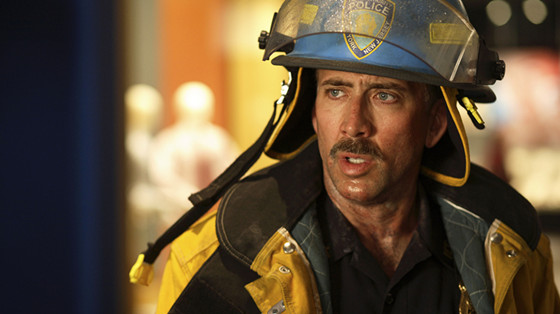
It’s hard to critique this film since its seemed to have been made for the right reasons. There’s no condemnation of the American intelligence agencies or the Bush presidency; it’s just the true story about two Port Authority police officers, John McLoughlin (Nicolas Cage) and Will Jimeno (Michael Pena), being stuck in the rubble of the Twin Towers. We also get a glimpse of other rescue workers and anxious family members. It doesn’t delve into the reasons given by the terrorists, nor does it give a hint to the eventual controversial invasion of Iraq.
That being said, it’s incredibly, sometimes overbearingly schmaltzy. Even if much of the dialog has been corroborated by the real survivors, Stone’s inability to show restraint doesn’t help the script. He held himself back on the political issues, sure, but maybe it would have been better if did this on the sentimental angle as well.
A more noble effort of Stone’s later (and troubling) filmography, but not without its flaws. And one can’t help but laugh when you see Nicolas Cage in a mustache.
13. W. (2008)
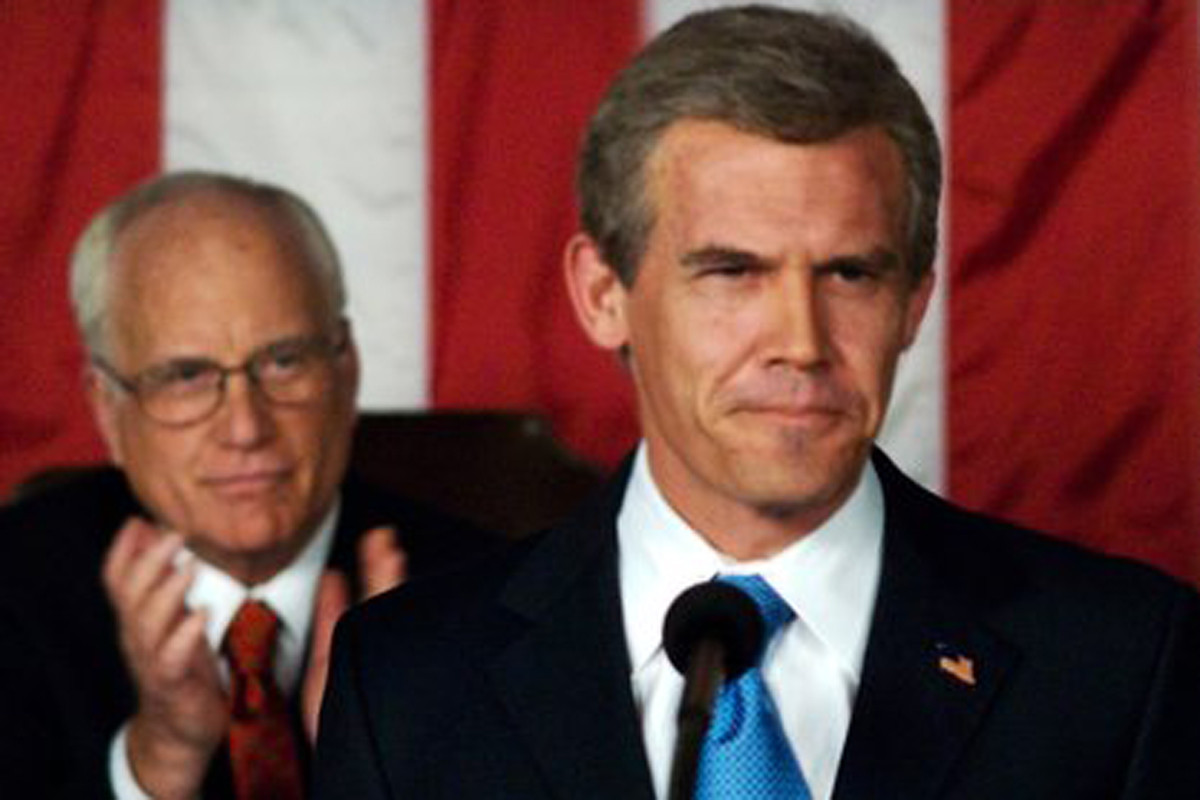
Before Donald Trump took over the spot as the most reviled president of the last century, George W. Bush, with his imaginative weapons of mass destruction, was perceived as the worst America had to offer. But while Trump is often seen by liberals as a return to authoritarianism – or at the very least, a resurgence of American isolationism in the vein of Charles Lindbergh – Bush symbolized the failing the neoconservative dream. Bush’s legacy would set in motion the anti-sentiment that would come to be so prescient in American political discourse.
Even if you know what side he’s on, Stone’s take on the 43rd president was bound to be interesting. But much to our surprise, the film is not nearly as scathing as one would expect. He’s not as insecure as Stone’s previous biographical subject Richard Nixon. He’s not damaged – he just seems naive.
He just wanted to do right by his family’s legacy, and make a positive mark on the world. In “Nixon”, we get black-and-white cuts of the past or the troubled psyche of the subject. We see none of this here. It’s not that Bush is a saint: we see frat-boy antics, drunken driving, and misguided religious idolatry. But he seems like a good man – it’s the system and the people he surrounded himself with that would ultimately taint his legacy.
Josh Brolin does a pitch-perfect job as the titular president and he’s surrounded by an excellent cast: Scott Glenn as Donald Rumsfeld, Jeffrey Wright as Colin Powell, Toby Jones as Karl Rove, but the stand-out, unsurprisingly, is Richard Dreyfuss as the villainous Dick Cheney. Dreyfuss gets the chew the scenery in the film’s most memorable sequence in which he illustrates the importance of invading Iraq for American dominance. An indicator that this film is quite nuanced is the appearance of James Cromwell as George Bush, Sr., an avowed conservative.
However, despite the great performances, it’s surprisingly forgettable. Considering its release date – November 2008 – it’s hard to not see this film as an attempt to sway voters. It seemed that Stone did everything he could to not make the film too incendiary and in turn, it never becomes engaging enough, considering the subject matter.
It never moves the audience; it comes close, but it’s not funny or smart enough to be a satire. It’s a biographical piece with no bite, and another example of Stone’s diminishing strength as a filmmaker. If he had waited after Jean Edward Smith’s biography on Bush came out, giving it more historical perspective, we could have had something special.
12. Any Given Sunday (1999)
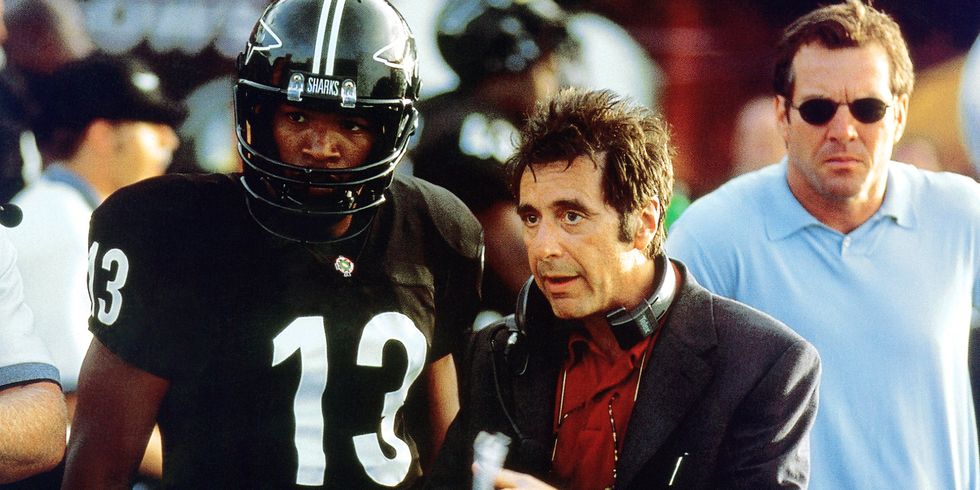
“Any Given Sunday” shows us inside of the high-stakes world of football, through the eyes of a down-and-out coach (Al Pacino), an aging football player (Dennis Quaid), an up-and-coming star (Jamie Foxx), and the team’s owner (Cameron Diaz).
This could perhaps be seen as the last of Stone’s great run. His take on the commercial world of football is superbly entertaining but at times surprisingly hollow. In a way, this film is a precursor to the now-famed HBO show “Ballers”, where the world of football is glamorized to an agonizing degree. There is some interesting unscrupulous maneuvering behind the scenes, most notably when general manager Pagniacci (Cameron Diaz) makes deals with a team’s physician, Mandrake (played in a wonderfully sleazy fashion by James Woods), to keep certain players, regardless of their medical condition, on the field.
But despite the NFL refusing to aid the film’s production, the film never delves deep enough into the dark commercialization of the world of football. There’s not enough insight into the psyche of the professional football players. There is the narcissism that comes with fame, some hedonism, but the suicidal nature into which these players enter the field is not explored enough. There is simply not enough sleaze and instea Stone loses himself in flashy MTV editing and sports melodrama.
At times, it’s highly effective, particularly during the moving speech by Pacino – who is at his shouting best in this film. But one can’t help but feel that Stone was mesmerized by the glitz and glamour of the football world. One could only imagine the greatness of this film if Robert Altman would have directed this film instead. Altman never made excuses about our humanity; he saw the animal for what it is was. Stone, on the other hand, can’t help but fall in love with his subjects.
11. U Turn (1997)
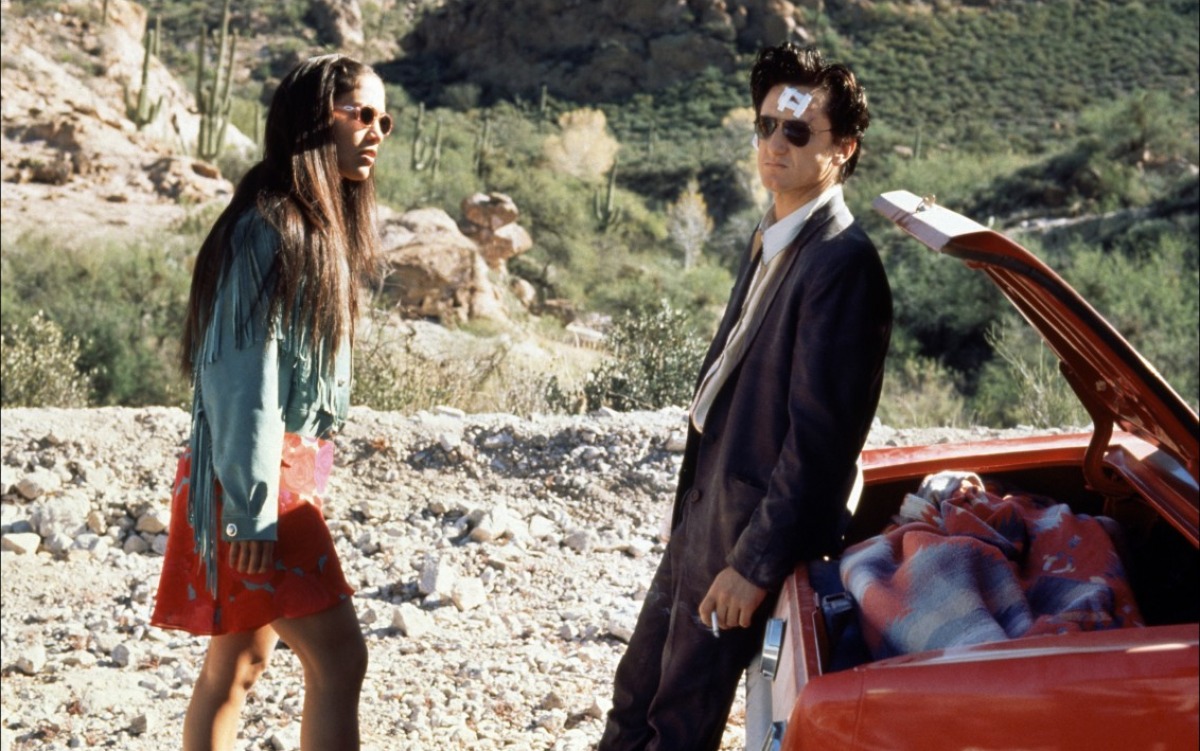
Bobby, a degenerate gambler, is on his way to his massive debt to digit-slicing gangsters when his car breaks down in the Arizona desert. While he’s waiting for his car to be fixed by a monstrously disgusting mechanic (a scene-stealing Billy Bob Thornton), he drifts around in the town of Superior, meeting all manner of eccentric characters. When he tries to leave, the forces of Superior seem intent on making him stay…
This is arguably the most fun film Stone has made. It’s a simple noir flick where everything goes from bad to far worse until you end up with a pile of corpses. The film seems to balance just enough restraint from Stone; it goes all the way with his usual stylistic flourishes without lapsing into political preaching. You wish Stone would make more of these kinds of films.
As can be expected, the casting is nearly the highlight. Jennifer Lopez plays the femme fatale role; Nick Nolte as a husband with a sickening secret; the late great Powers Booth as the town sheriff; Joaquin Phoenix as an overly jealous boyfriend to the dimwitted Jenny, played by Claire Danes; Jon Voight as a blind Navajo man; and Laurie Metcalf makes a cameo as an overly emotional clerk. However, nobody makes an impression like Billy Bob does as the bunny-suit wearing mechanic from hell.
Sean Stone gives a perfect performance, riding the line between having us feel sorry for him as things just keep going wrong, but also having a lot of fun watching him suffer. It’s schadenfreude at its best. There’s no politics, no deep state calling the shots, manipulating the people’s perception. Stone holds back and relaxes for once. It’s just human nature at its worst – and boy, is it entertaining.
10. The Doors (1991)
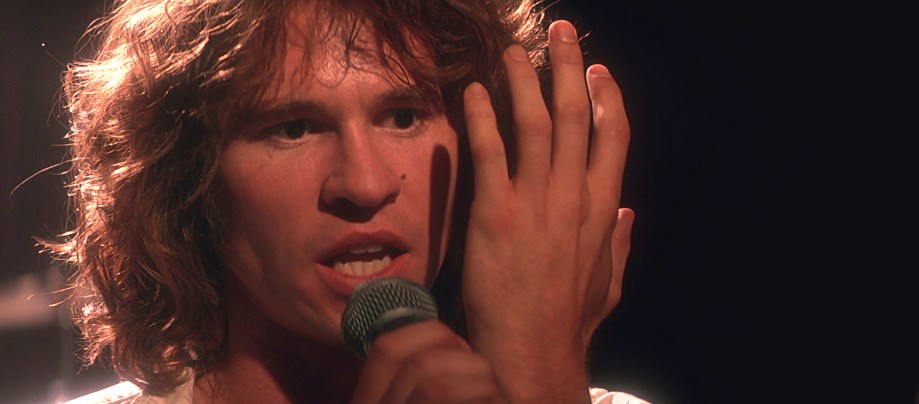
“The Doors” is a biopic about Jim Morrison, made by a man who truly admired his subject. This is apparent not so much in the film’s realism, but in the way the film mythologized its subject without a hint of irony. Whether or not the film is truly accurate is up for debate, but there’s no question that Stone understood what Morrison stood for – whether this reflects reality or not.
Morrison is played by Val Kilmer, who seems to be born to play the part. This is a man who believed himself to be a legend, whose success only confirmed his delusions of grandeur, and Kilmer portrays his perfectly. You don’t see Kilmer on screen – you see the actual Jim Morrison. The surviving members themselves were stunned by the results.
The rest of the cast, like most of Stone’s films, is outstanding. The supporting cast includes Meg Ryan, Kevin Dillon, Kyle MacLachlan, Michael Madsen, Billy Idol, Michael Wincott, a deranged Kathleen Quinlan, Frank Whaley, and the eccentric Crispin Glover plays the equally eccentric Andy Warhol. Stone also brilliantly recreates the allure and dreamlike quality of the 60s and if you’re a fan of the setting, this is essential viewing.
It becomes very obvious throughout the film that Stone really bought into Morrison’s shamanic wisdom, and evidence of this can even be found in Stone’s other work. Stone believes that the cure for the white man’s existential ills could be found in the ancient wisdom of the Native Americans. The 60s saw a drug-addled revival for this naturalistic spirituality, and many believed that era represented the dawn of a spiritual revolution. But as Peter Fonda’s character in “Easy Rider” would hauntingly state before his demise: ”We blew it.” It was all a dream, but some refused to wake up. The dream was just too beautiful.
Whether or not you believe it, this connection Stone has with Morrison made him the ideal candidate to write and direct an epic Jim Morrison biopic. Perhaps a more realistic portrayal of this deluded mind would have been superior but it wouldn’t be as fun. Usually I would stand against the notion of ’emotional truths’ instead of historical accuracy, but in this case, perhaps this was the best way to go.
9. Talk Radio (1988)
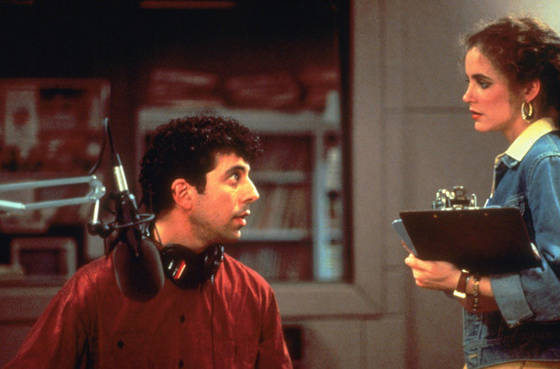
It’s easy – you lost faith in humanity. The people are gullible and stupid. Probably you lost some faith in people looking at the comments of this article. The people voted for a dunce, but the other candidate was a hack. All you want is for people to cut the bullshit. You don’t want a revolution, you just want some sanity.
But even if you think you see everything clearly, even if you think you comprehend truth, that still doesn’t mean you can fall victim to your own hubris. This the central thesis of “Talk Radio”, arguably Oliver Stone’s most underrated picture. Based on the real-life murder of radio personality Alan Berg and a play co-written by the film’s star Eric Bogosian, the film is a heart-wrenching and moving character study of a radio personality and his descent into depression and destructive misanthropy.
Bogosian is incredible in the part, and it would be the definitive role of his career – and let’s be honest, his later roles can’t even compare. There is also excellent support from Ellen Greene, Alec Baldwin, Oliver Stone’s regular John C. McGinley, Leslie Hope, John Pankow and the voicing talents of Michael Wincott.
When he finally ventures into such a dark hole at the end of the film – pushing everyone he loves out of the way – you wish Stone would have made more smaller pictures like this. This is Stone at his most pure: frustration about the ignorance and hatred running rampant in American political discourse.